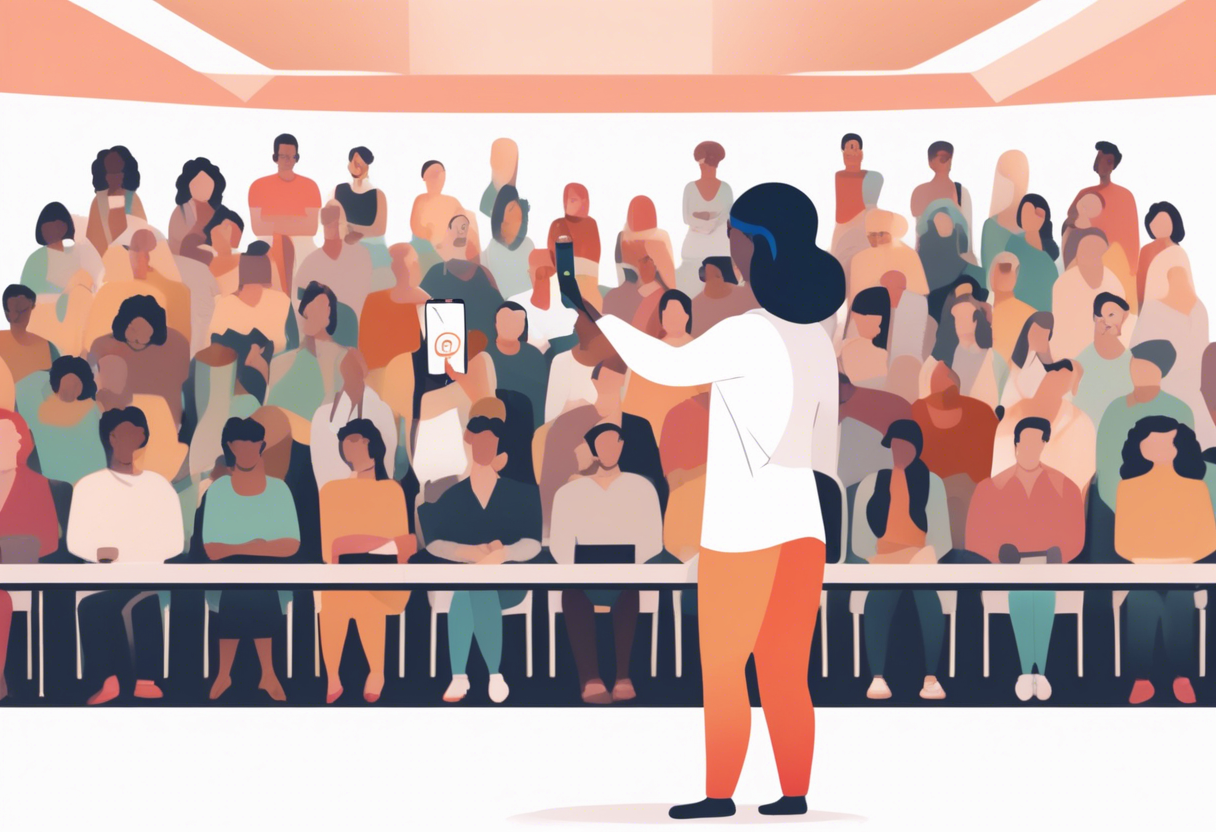
Public speaking. Just hearing those words can make even the bravest folks a bit nervous. Did you know about 75% of people feel anxious about it? It's something many struggle with, often improving through practice and coaching. But here's a twist: what if technology could help boost your speaking skills? That's where AI steps in, shaking things up in communication. In this piece, we'll look at how AI is changing the way we tackle public speaking. It offers fresh tools and real-world uses that might turn even the shyest person into a confident speaker. From AI-powered feedback to tailored coaching, there's a lot to explore. So, is AI the key to getting better at public speaking, or should we stick with traditional coaching? Let's find out!
Summary: This article discusses the challenges of public speaking and explores how AI solutions can improve public speaking skills, comparing AI with traditional coaching methods. It includes practical use cases, examples, and a FAQ section to address common questions.
The Challenge of Public Speaking and the Role of AI
Understanding Anxiety in Public Speaking Skills
Public speaking anxiety, or glossophobia, affects a significant portion of the population—about 77% of people in the U.S. experience it. This isn't just a minor case of nerves; it can significantly impact mental health. Around 40 million adults report feeling anxious when they have to speak in public. This fear is often linked with social anxiety disorder, affecting nearly 90% of those diagnosed.
However, confidence tends to increase with age and experience. Approximately 69% of individuals over 45 feel comfortable speaking in public, compared to only 25% of younger individuals aged 16 to 24. A major contributor to this anxiety is a lack of preparation, with 90% of people feeling stressed before presenting. Despite the potential negative effects on careers and earnings, only 8% of those affected seek help.
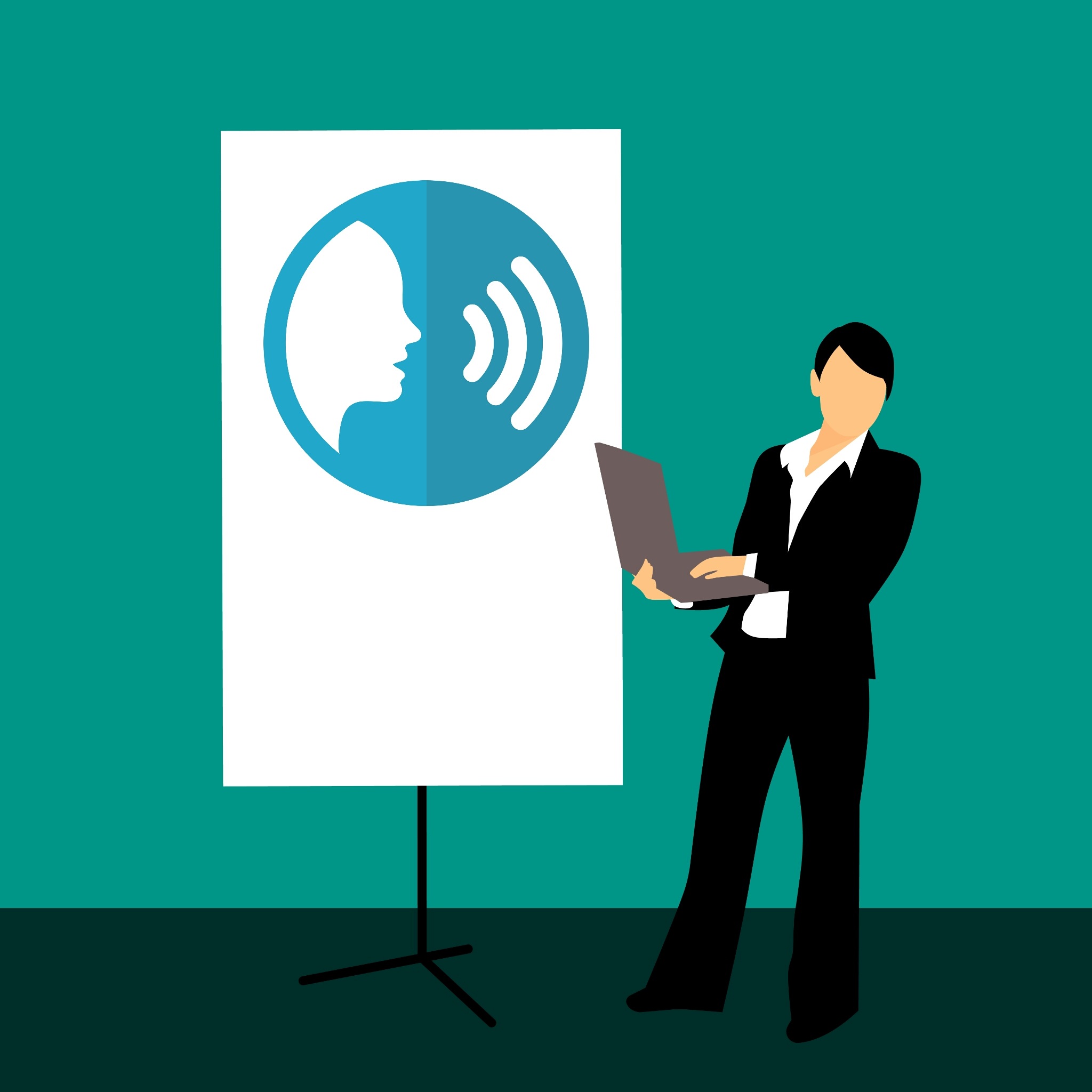
Education level also plays a role—24% of college graduates fear public speaking, compared to 52% of those with only a high school diploma. Millennials, in particular, struggle to maintain connections during talks, highlighting generational differences in communication styles. Learn more about public speaking anxiety.
AI Tools for Enhancing Public Speaking Skills
AI is revolutionizing the way individuals improve their public speaking skills by providing personalized feedback and tools to manage anxiety. AI-powered virtual coaches and speech analysis tools, such as Orai, allow individuals to practice in low-pressure environments, boosting confidence and enhancing delivery.
These tools analyze speech patterns, body language, and audience engagement, offering real-time suggestions. They address common issues like pacing, filler words, tone, and eye contact, which are crucial for effective communication. For those facing unique challenges, such as individuals on the autism spectrum, AI tools can tailor strategies to meet their specific needs, making public speaking more inclusive.

Moreover, AI platforms make public speaking education more accessible and affordable than traditional coaching. Explore more about AI in public speaking.
Platforms like VirtualSpeech provide immersive training using virtual reality, allowing users to practice in realistic settings. Over 550,000 users from 130+ countries have utilized VirtualSpeech, with 93% recommending it and 95% stating it enhances their preparation for real-life speaking. Users report a 20% improvement in skills after just 30 minutes of practice with AI feedback, reducing anxiety and refining public speaking abilities.
AI Solutions for Enhancing Public Speaking Skills
AI-Powered Speech Analysis for Public Speaking
AI tools are revolutionizing the way we enhance public speaking by employing smart algorithms to analyze various aspects of speech, such as tone, speed, and clarity. DeepBrain AI offers a tool that adds realism and emotion to speech, allowing you to adjust pitch, tone, and speed, making presentations more dynamic. These AI tools also provide feedback on pacing, tone, and body language, acting as virtual coaches to aid in improvement.
Amazon Bedrock, with its AI assistant, listens to speeches, identifying grammar slips, filler words, and repetitions, and offers suggestions for enhancement. AI coaches like Poised and Yoodli deliver live feedback on filler words and energy, helping sharpen delivery on the spot.
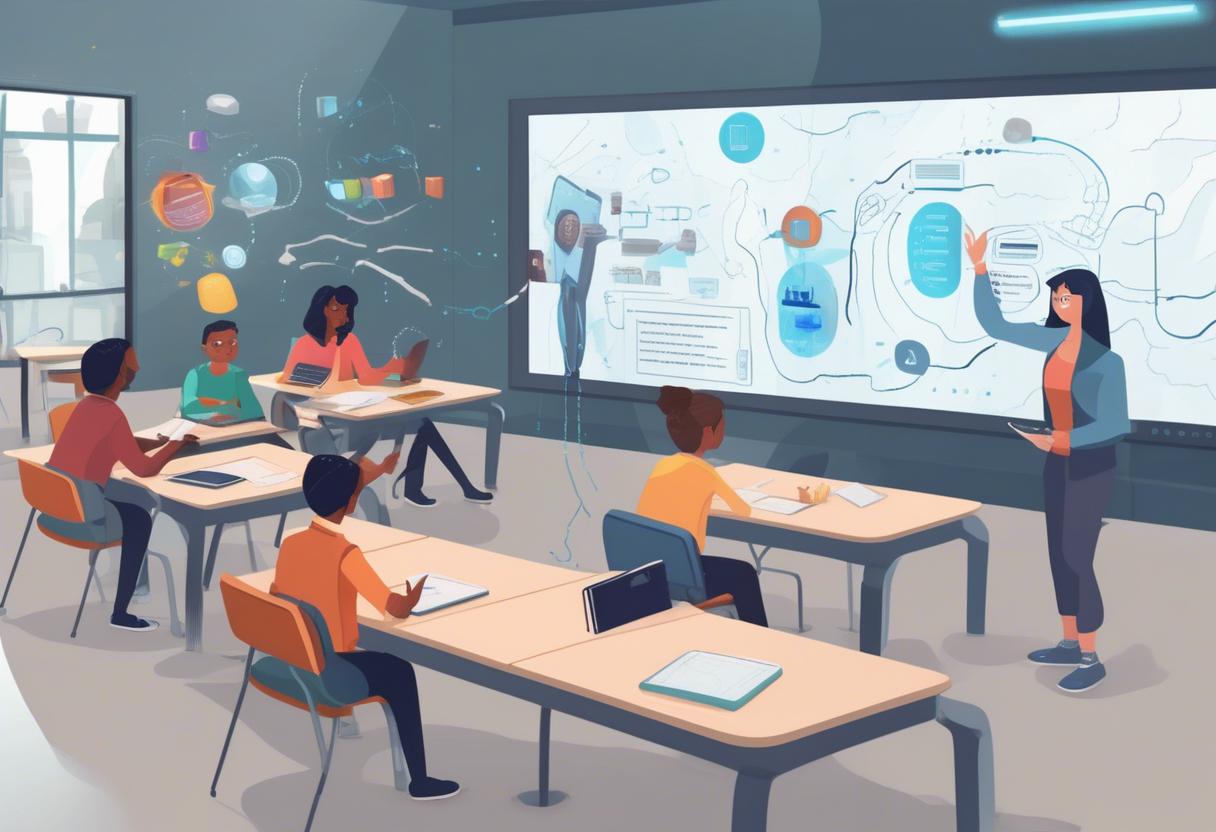
AI Tools for Improving Vocal Attributes
Your voice is a crucial element in public speaking, and AI tools are available to assist. They enable real-time adjustments to pitch, tone, and speed, enhancing expressiveness. The Poised AI coach helps eliminate filler words and clarifies speech by analyzing your communication in meetings and presentations. Yoodli offers live coaching for pacing and energy, benefiting both students and professionals.
These tools provide exercises and personalized feedback, allowing you to practice and improve your speaking skills. Orai, another AI speech coach, delivers detailed feedback on aspects like pace and confidence, aiding improvement through short daily sessions.
AI and Body Language Analysis for Public Speaking
Body language plays a vital role in public speaking, and AI can now analyze these non-verbal cues. DeepBrain AI offers coaching on body language alongside vocal feedback, enhancing your overall presentation. AI platforms can evaluate videos or live speeches to offer tips on gestures, facial expressions, and posture, making presentations more impactful.
For example, using DeepBrain AI might lead to suggestions like maintaining eye contact or reducing hand movements to boost confidence. ChatGPT can also serve as a virtual coach, providing body language advice tailored to your audience and context. By combining body language and speech analysis, these AI tools offer a comprehensive approach to becoming a better speaker.
Incorporating AI into public speaking practice provides detailed feedback that is often difficult to obtain from human coaches. These tools are easily accessible and allow for practice at your own pace, regardless of your starting point. As AI continues to advance, its role in enhancing public speaking will expand, offering speakers new ways to engage with their audiences.
Practical Use Cases and Examples for Enhancing Public Speaking Skills
Case Study: Yoodli AI Coach for Public Speaking
Yoodli AI Coach is an innovative AI-powered tool designed to enhance your public speaking skills by providing real-time feedback on both content and delivery. If you experience nervousness or struggle with pacing, Yoodli offers a supportive environment to practice and improve.
Key Features:
- Real-Time Feedback: Analyze speech patterns, body language, and emotional connection.
- Safe Practice Space: Record and review your speeches to receive instant feedback.
- Skill Enhancement: Focus on voice variety and audience engagement.
For example, when preparing for a work presentation, Yoodli can assist with pacing, eye contact, and reducing filler words, helping you approach the presentation with increased confidence and reduced anxiety.
Deepbrain AI Studios for Virtual Public Speaking Practice
Deepbrain AI Studios leverages AI technology to create immersive video simulations for public speaking practice. This tool allows you to construct realistic AI avatars for rehearsing speeches, presentations, or pitches in a virtual environment, fostering comfort and familiarity with public speaking scenarios.
Core Benefits:
- Virtual Rehearsal: Simulate public speaking situations with AI-driven avatars.
- Enhanced Engagement: Incorporate visual aids and storytelling into your presentations.
- Repetitive Practice: Hone your speaking skills through repeated practice.

Consider a college student using Deepbrain AI Studios to prepare for a thesis defense, complete with slides and feedback on delivery and body language, to ensure a polished performance.
Comparative Analysis of AI Tools for Public Speaking Skills
When evaluating AI tools for public speaking, it's essential to understand the unique strengths each one offers. Yoodli AI Coach and Deepbrain AI Studios excel in different aspects of public speaking enhancement.
Yoodli AI Coach: Real-Time Feedback for Public Speaking
Yoodli focuses on providing real-time analysis and feedback, making it an excellent choice for addressing speech anxiety. It excels in identifying filler words, analyzing speech patterns, and offering pacing advice, perfect for refining verbal delivery and avoiding common speaking pitfalls.
Deepbrain AI Studios: Immersive Public Speaking Practice
Deepbrain AI Studios specializes in creating immersive virtual environments with AI avatars, ideal for experiential learning. Its strength lies in enhancing engagement through storytelling and visual aids, making it indispensable for improving presence and confidence in front of an audience.
Choosing the Right AI Tool for Public Speaking Skills
Selecting the appropriate AI tool depends on your specific needs. For detailed analysis and personalized coaching, Yoodli AI Coach is the ideal choice. If you aim to practice in lifelike settings and boost confidence, Deepbrain AI Studios is the way to go. Using both tools can provide a comprehensive approach: utilize Yoodli for refining speech and reducing anxiety, and Deepbrain for practicing in realistic, immersive settings, thus addressing both technical and experiential facets of communication.
The Human Element: AI vs. Traditional Coaching for Public Speaking Skills
AI as a Supplement to Human Coaching for Public Speaking
AI has revolutionized public speaking training by providing personalized, data-driven feedback. Tools like ChatGPT enhance speech content, structure, and delivery, complementing the efforts of human coaches. Additionally, platforms such as Poised and Yoodli offer real-time feedback on aspects like filler words, pacing, confidence, and clarity, allowing individuals to practice and improve at their own pace.
The integration of AI in public speaking training has led to the development of hybrid coaching models. These models merge AI's precise, real-time feedback with the emotional intelligence and personal touch of human coaches, providing a comprehensive approach to improving public speaking skills. AI tools offer a non-judgmental environment, reducing anxiety and enhancing skills through consistent, objective feedback. Some studies even suggest that AI tools can be as effective, if not more so, than human coaches in certain areas, underscoring their value as a valuable supplement or even an alternative.
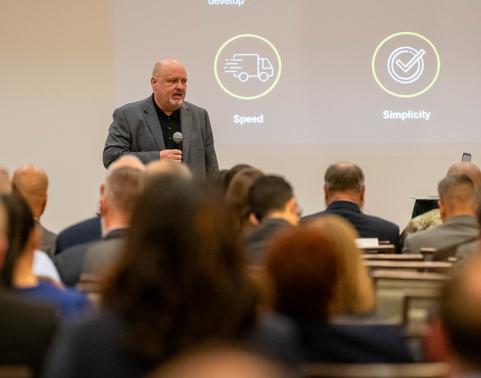
Psychological and Emotional Impact of AI Feedback on Public Speaking
AI feedback is immediate and unbiased, creating a safe space for practice without fear of judgment. This can alleviate the fear of making mistakes, encouraging more frequent practice and helping to overcome public speaking anxiety. However, while AI provides consistent, objective feedback, it lacks the emotional understanding and empathy that human coaches offer. This emotional support is crucial for building motivation and confidence.
AI feedback can sometimes be overly generic and may not fully capture emotional nuances, potentially limiting its coaching depth. By combining AI feedback with human coaching, individuals can benefit from both data-driven insights and empathetic support. This combination enhances both the technical and emotional aspects of public speaking, addressing the limitations of relying solely on AI. Experts recommend this hybrid approach for effective public speaking training, as it leverages the strengths of both AI and human expertise.

FAQ Section
How Does AI Improve Public Speaking Skills by Reducing Filler Words?
AI tools are highly effective in minimizing filler words such as "um" and "like" in speeches and presentations. These tools analyze your recorded speech, identifying each instance of these fillers. For example, an AI tool might suggest pauses or alternative words to enhance the smoothness of your speech.
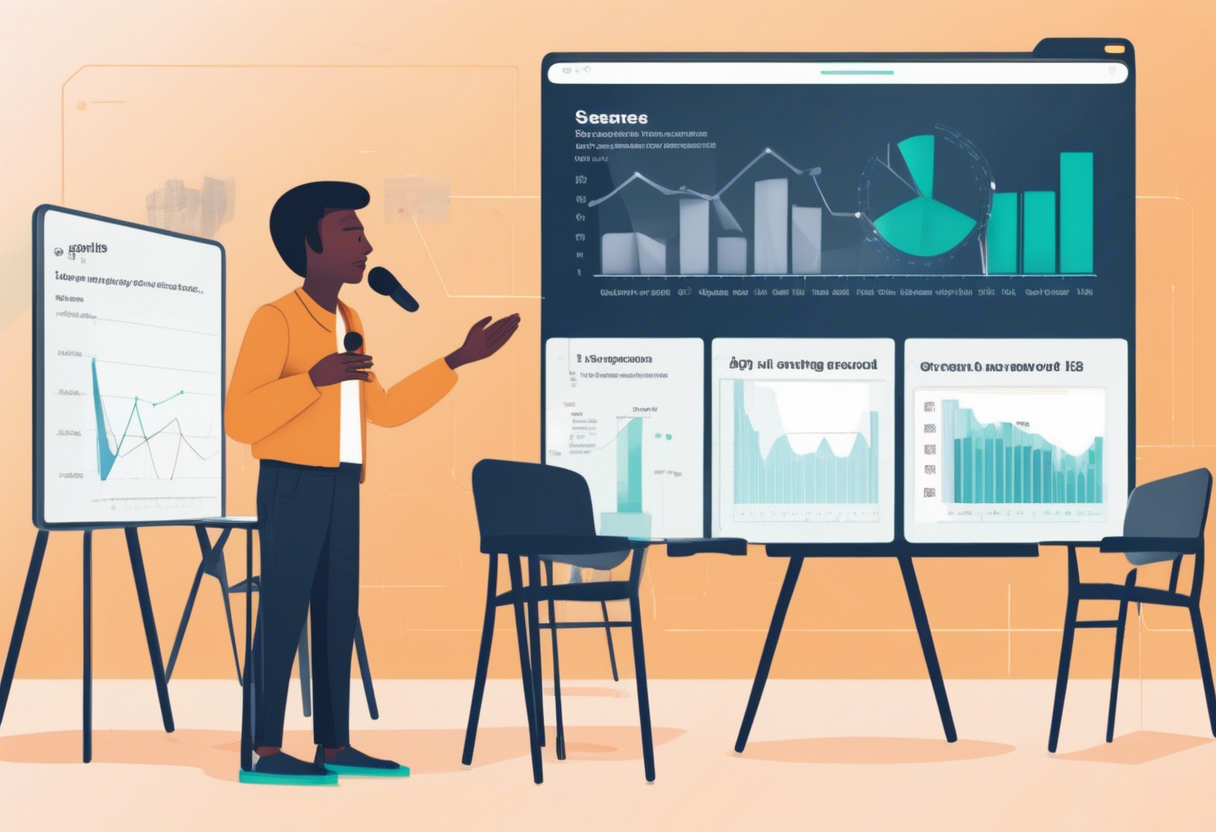
Unlike traditional practice or coaching, AI provides precise feedback by tracking the frequency of filler word usage and offering specific exercises. This enables you to recognize your habits and gradually improve your delivery, making you sound more polished and confident. By leveraging these tools, you can significantly reduce filler words, resulting in clearer and more professional communication.
Can AI Tools Enhance Public Speaking Skills with Body Language and Eye Contact?
AI tools are advancing in their ability to assess body language and eye contact. Some platforms utilize computer vision technology to monitor these aspects, providing feedback either during or after a session to facilitate improvement.
For instance, an AI app might use your webcam to evaluate how long you maintain eye contact or your posture during a practice speech, then offer tips for appearing more confident. Effective body language and eye contact are crucial for audience engagement, and AI supplements traditional coaching by providing an objective analysis of these areas.
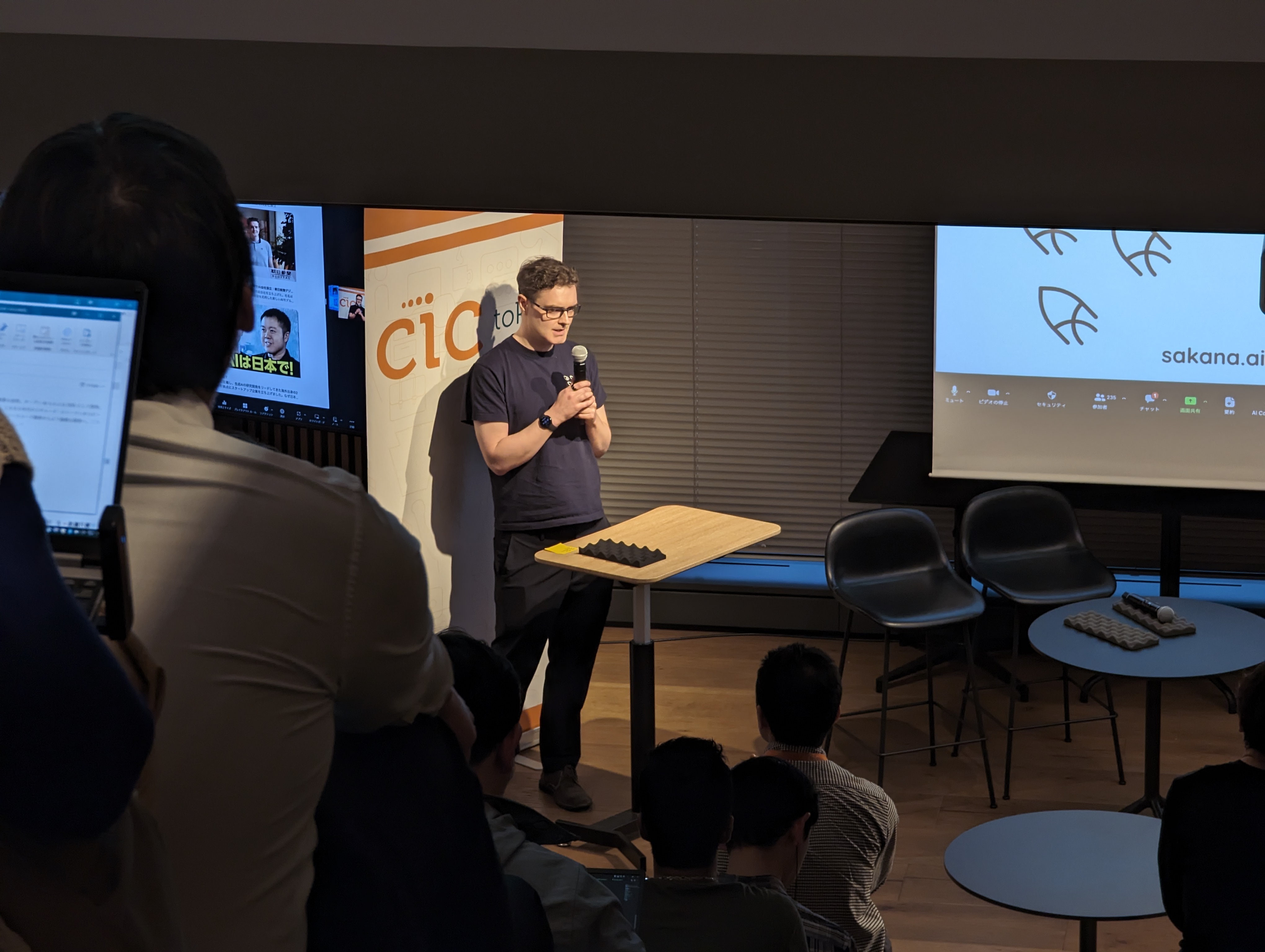
With detailed analytics, these tools pinpoint areas for improvement, such as excessive downward glances or awkward gestures. This feedback is invaluable for refining the physical elements of public speaking, ensuring you not only sound confident but also appear engaging and credible.
What AI Tools Offer Real-Time Feedback to Boost Public Speaking Skills?
Yes, there are AI platforms that deliver real-time feedback on aspects like speech pace, filler words, volume, and clarity during live presentations. These tools help you adjust your delivery on the spot, enhancing your confidence and effectiveness.
For example, a public speaking app might listen to you live and provide visual cues if you're speaking too quickly or using excessive fillers, allowing for immediate adjustments. This instant feedback enables real-time improvements in your delivery.
Incorporating AI into public speaking training complements traditional methods by offering precise, objective, and sometimes instant feedback on speech fluency, nonverbal cues, and delivery. Ultimately, this boosts your communication skills.